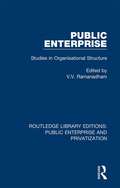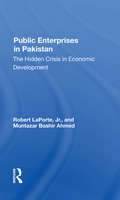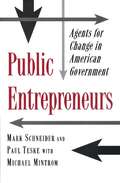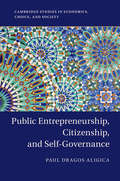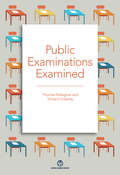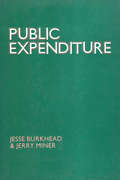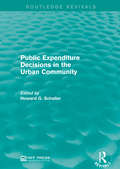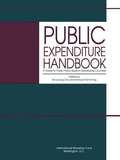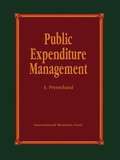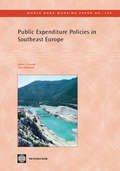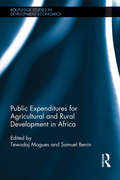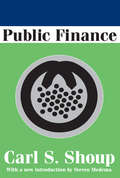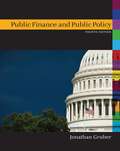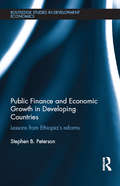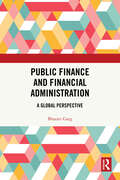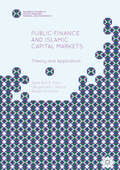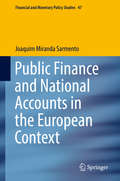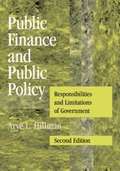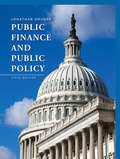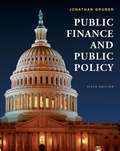- Table View
- List View
Public Enterprise: Studies in Organisational Structure (Routledge Library Editions: Public Enterprise and Privatization)
by V. V. RamanadhamOriginally published in 1986, this volume brings together papers on the organisational structure of select public enterprises from nine countries, developed and developing. They are set in different forms, work in different sectors and have diverse experiences, often on similar issues. The papers are written by top executives of the respective enterprises and, therefore, contain an authentic presentation of the problems and processes of organisation. The editor has included, at the beginning, an analytical review on certain fundamental aspects of organisational structure which, for the purpose of this volume, has been conceived in wide terms. Every one of these aspects is not exactly covered by every empirical paper. At the end he has provided a comparative review, trying to keep to a minimum repetition of material from the papers.
Public Enterprises In Pakistan: The Hidden Crisis In Economic Development
by Robert Laporte Muntazar Bashir AhmedThis book contains a study of the economics and management of public enterprises in Pakistan. It examines their performance, organizational behavior, relationships with other government organizations outside of the sector, and the issues that confront the public enterprise sector and the government.
Public Entrepreneurs: Agents for Change in American Government
by Mark Schneider Paul Teske Michael MintromSeizing opportunities, inventing new products, transforming markets--entrepreneurs are an important and well-documented part of the private sector landscape. Do they have counterparts in the public sphere? The authors argue that they do, and test their argument by focusing on agents of dynamic political change in suburbs across the United States, where much of the entrepreneurial activity in American politics occurs. The public entrepreneurs they identify are most often mayors, city managers, or individual citizens. These entrepreneurs develop innovative ideas and implement new service and tax arrangements where existing administrative practices and budgetary allocations prove inadequate to meet a range of problems, from economic development to the racial transition of neighborhoods. How do public entrepreneurs emerge? How much does the future of urban development depend on them? This book answers these questions, using data from over 1,000 local governments.The emergence of public entrepreneurs depends on a set of familiar cost-benefit calculations. Like private sector risk-takers, public entrepreneurs exploit opportunities emerging from imperfect markets for public goods, from collective-action problems that impede private solutions, and from situations where information is costly and the supply of services is uneven. The authors augment their quantitative analysis with ten case studies and show that bottom-up change driven by politicians, public managers, and other local agents obeys regular and predictable rules.
Public Entrepreneurs? Picking a Path
by Mitchell Weiss Matthew SegneriDirect entry into government remained an uncommon post-HBS path, with only 1%–2% of recent classes going directly into the public sector. But, for public-minded MBAs, government wasn’t the sole province for public problem-solving. MBAs could join or launch companies that sell to government (or directly to citizens), lead venture funds, operate as ecosystem partners, and more. What felt like a new array of opportunities, though, raised a host of additional questions: What does a career path for a public entrepreneur actually look like? In which sector (private vs. public) should I start? Should I run for elective office? What does that imply for how I pursue my career? And often, and perhaps especially, what do I need in order to be able to move back and forth between sectors? In the spring of 2017, four students in the MBA class felt incredibly fortunate. After two years of business school, strong opportunities awaited each of them. None was wanting for work. However, they still had to decide which posts to take at the moment, if any at all.
Public Entrepreneurship, Citizenship, and Self-Governance (Cambridge Studies in Economics, Choice, and Society)
by Paul Dragos AligicaIn this book Paul Dragos Aligica revisits the theory of political self-governance in the context of recent developments in behavioral economics and political philosophy that have challenged the foundations of this theory. Building on the work of the 'Bloomington School' created by Nobel Laureate Elinor Ostrom and Public Choice political economy co-founder Vincent Ostrom, Aligica presents a fresh conceptualization of the key processes at the core of democratic-liberal governance systems involving civic competence and public entrepreneurship. The result is not only a re-assessment and re-articulation of the theories constructed by the Bloomington School of Public Choice, but also a new approach to several cutting-edge discussions relevant to governance studies and applied institutional theory, such as the debates generated by the recent waves of populism, paternalism and authoritarianism.
Public Equities Impact Investing at BlackRock
by Michael Norris Shawn Cole Vikram Gandhi John MaskoIn early 2021, BlackRock-the world's largest asset manager with $9 trillion in assets under management (AUM)-sought to become a leader in promoting environmental and social sustainability. Over the previous ten years, CEO Larry Fink had written an annual open letter to CEOs, pushing them to view sustainability and climate change planning key components of any long-term strategy. He had built an investment stewardship committee to attend portfolio company shareholder meetings and implement these goals. He had also recruited a team of prominent impact investors to BlackRock to lead a new impact investing fund. Now, as the new fund came of age, both the fund's managers and BlackRock's senior leadership faced difficult choices. At the fund level, they needed to define how to implement their two main selection criteria-intentionality and additionality-in choosing the fund's next stocks. At the company level, BlackRock's leaders wrestled with the question of just how much impact BlackRock could have on the companies it invested in, when well above half of BlackRock's AUM were invested passively.
Public Examinations Examined
by Thomas Kellaghan Vincent GreaneyHigh-stakes public examinations exert a dominant influence in most education systems. They affect both teacher and student behavior, especially at the middle and upper levels of secondary education. The content of past examinations tends to dictate what is taught and how it is taught and, more important, what is learned and how it is learned. By changing aspects of these examinations, especially their content and format, education systems can have a strong positive impact on teacher behavior and student learning, help raise student achievement levels, and better prepare students for tertiary-level education and for employment. Examination agencies, many of which have followed the same procedures over decades, can learn from the successes and failures of other systems. This book addresses current issues related to the development, administration, scoring, and usage of these high-stakes public examinations, identifying key issues and problems related to examinations in many emerging market economies as well as in advanced economies. The book’s primary audience consists of public examination officials on national, regional, and state examination boards, but the book should also be of interest to senior education policy makers concerned with certification and learning achievement standards, to academics and researchers interested in educational assessment, to governmental and education agencies responsible for student selection, and to professionals at development organizations. “This extremely well-written and comprehensive book offers a timely review of the diversity of public examination practices worldwide; of the tensions between examinations and learning; and of the technical expertise involved in the creation of valid, reliable, and fair assessments. It reminds us that as “the diploma disease†? takes hold with an ever-greater intensity at every stage of education worldwide, and the commercial business of testing flourishes, those concerned with educational quality and meaningful learning must be on guard to prevent the assessment tail wagging the educational dog.†? Angela W. Little, Professor Emerita, Institute of Education, University College London “This book is very well structured and written and draws on the authors’ remarkable global knowledge across countries and histories. It will be a great asset both to administrators responsible for examinations and to academics and other professionals who seek to understand the nature and impact of examinations of different types and in different settings.†? Mark Bray, UNESCO Chair Professor of Comparative Education, University of Hong Kong; and former Director, UNESCO International Institute for Educational Planning “I am sure that Public Examinations Examined, which thoroughly analyzes the practice of public examinations in different countries and makes profound and well-grounded conclusions, will arouse very great interest and will serve to further improve public examinations.†? Victor Bolotov, Distinguished Professor, Higher School of Economics, National Research University, Moscow; member, Russian Academy of Education; and former Deputy Minister of Education, Russian Federation
Public Expenditure
by S.S. StevensIn all highly industrialized countries public expenditures are a substantial and growing share of total economic activity. The authors integrate normative and positive theory and empirical analysis of public expenditure, concentrating on the optimal provision of public goods and the estimation of their costs and effects. This volume emphasizes the techniques that are available for reaching collective decisions about the provision of public goods and stresses the importance of income distribution and intergovernmental fiscal relations. In a mixed economy, where the public sector is growing faster than the private sector, the nature of public expenditures must be closely evaluated and studied. This book is designed to focus on and delineate controversies about public expenditure--to define what it is, analyze its function, show how it operates, and finally to evaluate research on this important subject.The book considers the theories of leading economists (Kenneth Arrow, Lionel Robbins, Carl Shoup, James Buchanan, Paul Samuelson, Richard Musgrave, and others) in arriving at a clear statement of theory in its application to operational problems. Appropriate attention is paid to current techniques such as program budgeting, cost-benefit analysis, and the analysis of the determinants of public expenditure. The book is unique in its emphasis on the integration and critique of contemporary theories of public expenditure, of distributional concerns, and of the political framework of public expenditure decisions. It provides a necessary resource for professional economists required to deal with public expenditure problems in research or practice.
Public Expenditure Decisions in the Urban Community (Routledge Revivals)
by Howard G. SchallerIn 1962, the Committee on Urban Economics held a conference on public expenditure decisions in order to promote analysis of the issues facing the public sector of the urban economy. Originally published in 1965, this report pulls together key papers presented at this conference discussing issues such as urban services, the patterns of public expenditure and the quality of government services in urban areas to draw conclusions on the difficulties of analysis and how economic tools could be utilised more effectively to solve these difficulties. This title will be of interest to students of environmental studies and economics.
Public Expenditure Handbook
by Richard Hemming Ke-Young ChuA report from the International Monetary Fund.
Public Expenditure Management in Francophone Africa: A Cross-Country Analysis
by Yaya MoussaA report from the International Monetary Fund.
Public Expenditure Policies in Southeast Europe
by Satu Kahkonen Ivailo V. IzvorskiThe countries of Southeast Europe have undergone a significant transition over the past decade. Helped by macroeconomic stabilization and efforts in advancing structural reforms, real GDP growth has picked up this century. Fiscal adjustment has been an integral part of the transition. Expenditure cuts have helped trim spending relative to GDP in most countries in the region and cut fiscal deficits everywhere except in Serbia. Progress in fiscal consolidation has been substantial, but in several of the countries the government's presence in the economy remains oversized. Costs related to advancing EU integration and completing reforms are expected to generate further pressures for public spending. Creating the fiscal space for addressing such pressures would require a further reduction in existing spending, given that there is still scope for increasing tax rates. The report identifies key remaining challenges and proposes a menu of options in further reforms in sectors that account for the largest shares of public spending, and where reforms are likely to have significant budgetary implications. The sectors discussed in the report are social protection, health, education, public administration, and infrastructure.
Public Expenditures for Agricultural and Rural Development in Africa (Routledge Studies in Development Economics #94)
by Tewodaj Mogues Samuel BeninWhereas there is plenty of work looking at macroeconomic effect of public spending on growth and poverty in Africa as well as studies of the impact of spending or investment in one economic sector on outcomes in that sector or on broader welfare measures, this book fills a much needed gap in the research looking how the composition of public spending affects key development outcomes in the region. The book brings together recent analysis on the trends in, and returns to, public spending for agricultural growth and rural development in Africa. Case studies of selected African countries provide insights on the contributions of different types of public expenditures for poverty, growth and welfare outcomes, as well as insights into the constraints in gaining development mileage from investments in the agricultural sector.
Public Finance (Social And Economic Studies Of Post-war France Ser.)
by Carl ShoupBroad in scope and carefully balanced in emphasis, this book is a major treatise on the theory and practice of public finance. It is unique in its presentation of a worldwide perspective and in its treatment of both the instruments of public finance and the goals, effects, and criteria of public finance measures. The book is divided into three parts. Book One defines the field, specifies the possible meaning of the "effects" of a public finance measure, and describes the criteria by which these measures are commonly appraised.Book Two is concerned with micro public finance and opens with a discussion of the theory of public goods in general. Each of the major free government services and types of transfer payments as well as the taxes that government employs are then examined. This section concludes with a chapter on the relevant aspects of government borrowing and inflationary finance. Book Three considers the major goals of public finance policy and describes how the various instruments described in Book Two can be used in achieving these goals. Among the topics treated are the use of appropriate instruments to resolve conflict in goals, conceptual problems of measuring the public finance sector and its maximum and minimum economic limits, consensus goals of equity full employment and Pareto-optimism use of resources, and goals that evoke conflicts of interest within any community.
Public Finance And Public Policy 4th Ed
by Jonathan GruberJonathan Gruber's groundbreaking Public Finance and Public Policy was the first textbook to truly reflect the way public policy is created, implement, and researched. Like no other text available, it integrated real-world empirical work and coverage of transfer programs and social insurance into the traditional topics of public finance. From its first edition, the book quickly became the market-leading text for Public Finance and Public Policy courses, and the margin is growing. Thoroughly updated, this timely new edition gives students the basic tools they need to understand the driving issues of public policy today, including healthcare, education, global climate change, entitlements, and more.
Public Finance and Economic Growth in Developing Countries: Lessons from Ethiopia's Reforms (Routledge Studies in Development Economics)
by Stephen B. PetersonPublic finance is crucial to a country’s economic growth, yet successful reform of public finances has been rare. Ethiopia is an example of a country that undertook comprehensive reform of its core financial systems, independent of the IMF and the World Bank, and successfully transformed itself into one of the fastest-growing economies in Africa. With Ethiopia’s twelve-year reform as its guiding case study, this book presents new analytical frameworks to help governments develop better financial reforms. It shows in detail how four core financial systems—budgeting, accounting, planning, and financial information systems—can be reformed. One of the principal findings presented is that governments must establish basic public financial administration before moving to more sophisticated public financial management. Other key findings include the identification of four strategies of reform (recognize, improve, change, and sustain), the centrality of ongoing learning to the process of reform, and the importance of government ownership of reform. This book will be of interest to researchers and policymakers concerned with public finance, developmental economics, and African studies.
Public Finance and Financial Administration: A Global Perspective
by Bharati GargThis book offers a comprehensive exploration of different aspects of public finance and its administrative practices across different countries. Based on a comprehensive review of existing literature, it combines theoretical exploration and practical case studies of developed and developing countries. Part I of this volume provides a basic understanding of the concept of public finance. Part II examines the role of budget with a detailed discussion of budgetary cycles in the U.S.A., Brazil, and India. It also provides an in-depth coverage of performance budgeting practices, focusing on the OECD countries. Part III focuses on intergovernmental federal fiscal relations with a special focus on India, along with the Ministries of Finance in the U.S.A., the U.K., and India. Part IV delves into audit systems and Supreme Audit Institutions, presenting case studies of France, Germany, the U.S.A., the U.K., and India. It also includes studies on the latest national and international reports to support the findings. This book will be useful to students, researchers, and teachers of Public Administration, Public Policy, Public Finance, Economics, and Management. It will also be an invaluable resource for professionals and policymakers, as it shall help strengthen their conceptual understanding of the subject.
Public Finance and Fiscal Policy - Fourth Edition
by Dr Rabindra K. Choudhury Dr Reema Choudhury Chakraborty"Public Finance and Fiscal Policy" by Rabindra K. Choudhury and Reema Choudhury Chakraborty provides a comprehensive overview of government financial operations and their economic impacts. It covers key areas such as taxation, government expenditure, public debt, budgeting, fiscal federalism, and the role of public sector enterprises. The book also delves into public choice theory and contemporary issues like globalization's effect on public finance. Through a blend of theoretical frameworks and practical examples, the authors elucidate the complexities of fiscal policies and their implications. Designed for students and practitioners alike, this text offers valuable insights into managing and understanding public finance in both developed and developing economies.
Public Finance and Islamic Capital Markets: Theory and Application (Palgrave Studies in Islamic Banking, Finance, and Economics)
by Abbas Mirakhor Syed Aun Rizvi Obiyathulla I. BachaThis book addresses the financing of government budgets with non-debt-creating flows through risk-sharing capital market instruments. It offers a comparative analysis with conventional finance to demonstrate the ability of Islamic capital market instruments to create an impetus for economic stability and growth. Rizvi, Bacha, and Mirakhor guide readers chronologically through the unfolding effects of macroeconomic policy implemented to reduce crippling sovereign debt, increase government financing, and guide governments to the path of economic progress.
Public Finance and National Accounts in the European Context (Financial And Monetary Policy Studies #47)
by Joaquim Miranda SarmentoThis book offers an essential guide to Public Finance and National Accounts in the context of the European Union. Since the creation of the Eurozone, fiscal policy has been at the heart of economic (but also political/media) discussions in the EU. From the Stability and Growth Pact (1997) to the more recent Fiscal Treaty, EU and Eurozone, countries have been subject to various fiscal rules. The importance of these rules, and of the subsequent procedures that every Eurozone country has to adhere to, is unquestionable. The book provides the reader with an in-depth understanding of the complex EU rules concerning fiscal policy, breaking down the corresponding legal texts into simple and accessible language. It has a broad interdisciplinary appeal, and scholars and practitioners whose work involves these areas will find it of particular interest.
Public Finance and Public Policy
by Arye L. HillmanThe second edition of Public Finance and Public Policy retains the first edition's themes of investigation of responsibilities and limitations of government. The present edition has been rewritten and restructured. Public choice and political economy concepts and political and bureaucratic principal-agent problems are introduced at the beginning for application to later topics. Fairness, envy, hyperbolic discounting, and other concepts of behavioral economics are integrated throughout. The consequences of asymmetric information and the tradeoff between efficiency and ex-post equality are recurring themes. Key themes investigated are markets and governments, institutions and governance, public goods, public finance for public goods, market corrections (externalities and paternalist public policies), voting, social justice, entitlements and equality of opportunity, choice of taxation, and the need for government. The purpose of the book is to provide an accessible introduction to the use of public finance and public policy to improve on market outcomes.
Public Finance and Public Policy
by Jonathan GruberJonathan Gruber's market-leading Public Finance and Public Policy was the first textbook to truly reflect the way public policy is created, implemented, and researched. Like no other text available, it integrated real-world empirical work and coverage of transfer programs and social insurance into the traditional topics of public finance. By augmenting the traditional approach of public finance texts with a true integration of theory, application, and evidence, Public Finance and Public Policy engages students like no other public finance text. Thoroughly updated, this timely new edition gives students the basic tools they need to understand the driving issues of public policy today, including healthcare, education, global climate change, entitlements, and more.
Public Finance and Public Policy
by Jonathan GruberWe are currently engaged in the most fundamental debate about the role of government in decades, and who better than Jonathan Gruber to guide students through the particulars in the new edition of his best-selling text, Public Finance and Public Policy, 6e. The new edition details ongoing policy debates, with special focus on the largest tax reform in 30 years. New topics include universal basic income, the legalization of pot, and congestion pricing. And, of course, there is an extensive, in-depth discussion of the debate over health care. At the heart of this new edition is the author's belief that at no other time has it been so important to know the facts, to distinguish facts from falsehoods, and to be thinking clearly about problem, policy, and politics. The sixth edition delivers on all counts.
